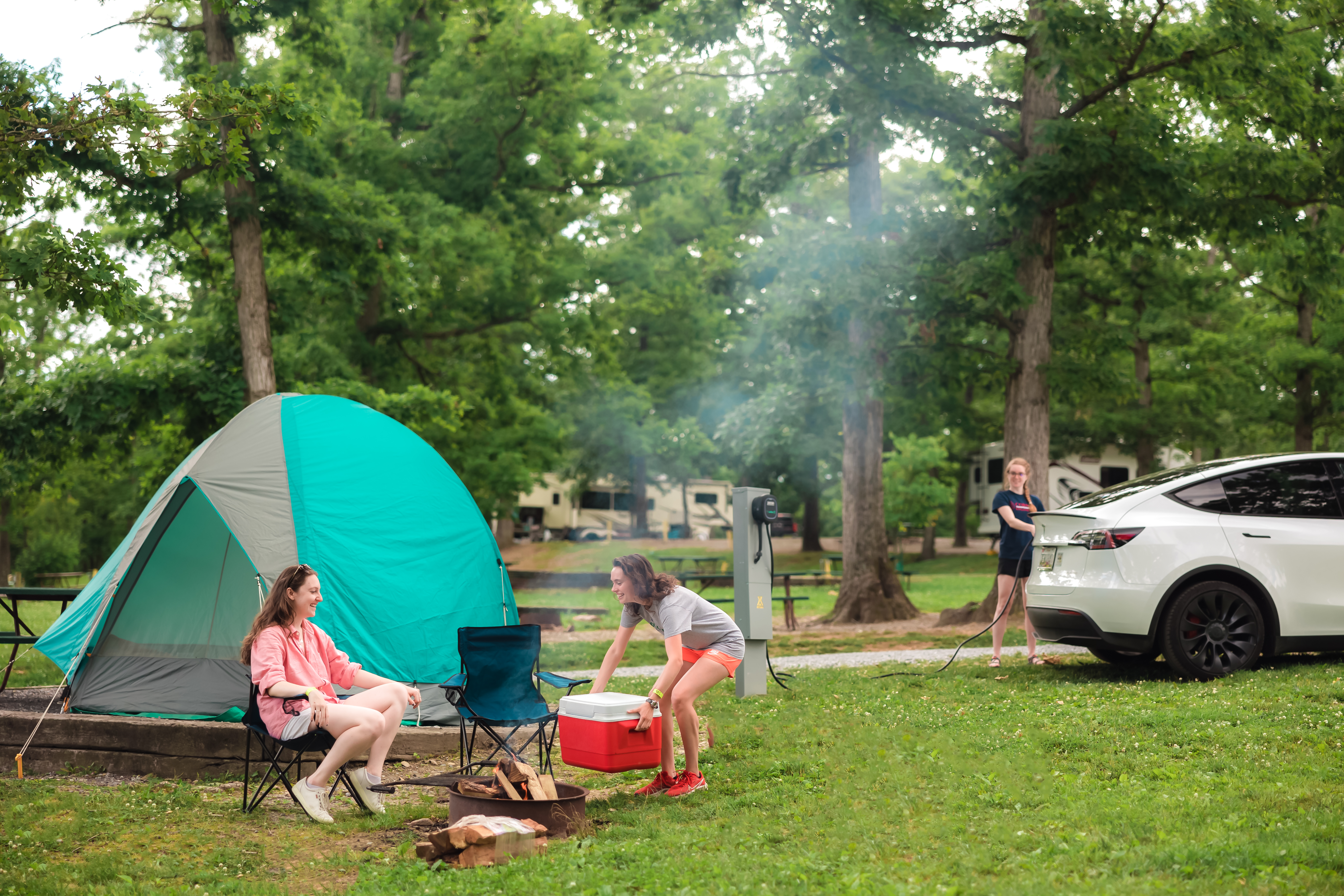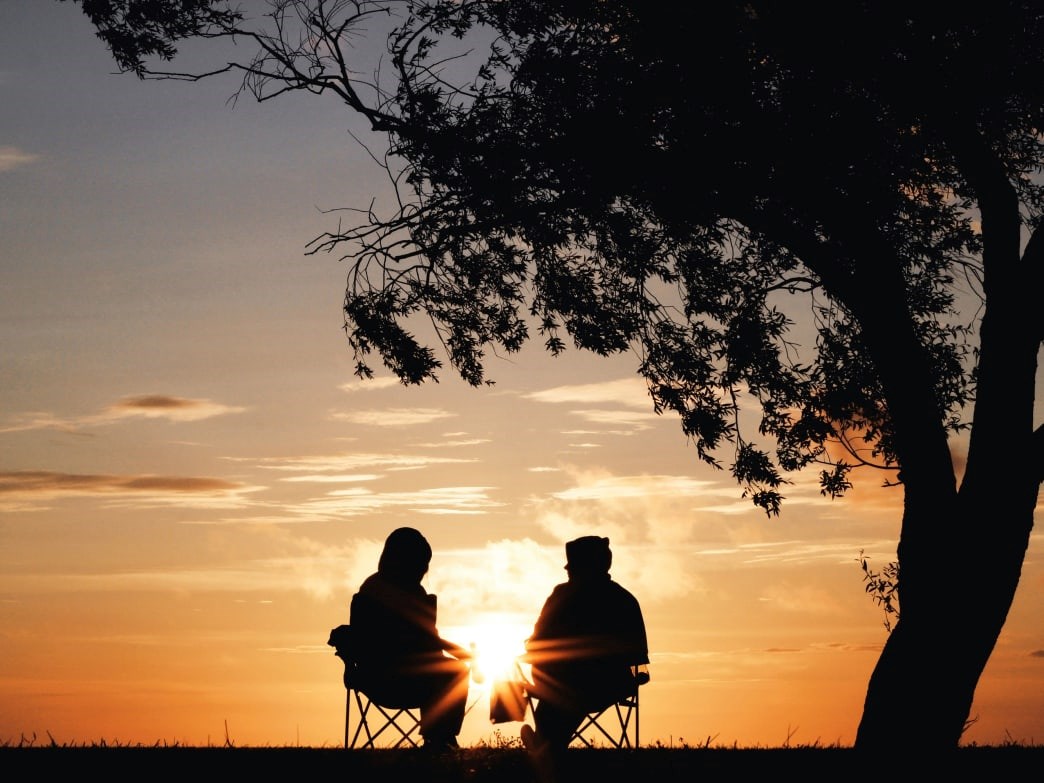Cell phones have added so much to our lives. They help us stay connected, safe, and organized. But you can have too much of a good thing. Being constantly online and phone-focused has some serious drawbacks.
The salve for cell phone saturation is an unplugged weekend in nature. It’s not just a nice thought, but a scientifically proven way to strip away the stress of excess screen time.
Here are seven ways a couple of days of no-tech time outdoors will help reset your body, mind, and soul.
1. Have better conversations with friends
Smartphones offer an interesting dichotomy. On one hand, they help you stay connected with far-flung friends and family. On the other hand, they get in the way of real, meaningful conversation.
MIT Sociologist Sherry Terkle explains it this way. “[Conversation is] where empathy is born, where intimacy is born—because of eye contact, because we can hear the tones of another person’s voice, sense their body movements, sense their presence.”
Yet in a recent poll, 82% of people said that cellphones deteriorated the quality of their conversations, Terkle said.
Sitting around a campfire is the ideal situation to regain quality, human interaction. With the phone packed away, there’s nothing but the crackling fire and occasional hoot of an owl to distract you from connecting with friends.
2. Hear all of nature’s glory
Have you ever noticed yourself relax after spending a quiet few minutes outdoors? It turns out, there’s science behind the sense of calm you experience while listening to a babbling brook or gentle breeze through the trees.
A study from the University of Sussex showed that when people listened to natural sounds, like the babbling brook, there was a pronounced shift in the part of the brain associated with relaxation and calm. Artificial sounds had the opposite effect. What’s more, the ability of natural sounds to soothe was greater in people with higher anxiety.
Listening to music, podcasts, or movies is a great distraction. But if you want to give your mind a rest and return to a natural state of calm, head outdoors, put down the phone, and have a listen to the symphony that surrounds you.
3. Sleep better
 Aaron Burden
Aaron Burden
A lack of sleep causes memory loss, weight gain, mood changes, and so many other physical and mental ailments. Yet the CDC says a third of Americans don’t get enough shuteye.
Among the main culprits behind a lack of restful sleep is cellphone use. The blue lights of their screens interrupt the production of melatonin, the hormone your body produces to control your sleep cycle. When melatonin is reduced, so is your ability to fall, and stay, asleep.
Give your body a chance to get back on a healthy sleep schedule and unplug from your phone every once in a while. Even better, do it while you’re camping so you can fall asleep to the sounds of a babbling brook.
4. Soak up the sunrise
Lack of exposure to the sun has been linked to all sorts of health issues including anxiety and PTSD. There’s no better time to get your daily fix than when the sun crests the horizon.
Unfortunately, phones have taken over as the first source of light and life we see in the morning. Most people (80% according to this research) look at their phones within 15 minutes of waking up.
Resist the urge to check social media and news sites when you’re camping. Instead, take a quiet few moments to contemplate the beginning of a new day while filling your daily requirement of vitamin D. Your body and mind will thank you for it.
5. Reduce stress
It’s nothing new to hear that people are addicted to their phones. But what does that really mean?
According to Victoria Strohmeyer, a registered psychotherapist with UCHealth Yampa Valley Medical Center, it means society is in a constant state of heightened tension. Every time you hear a notification or check your phone (which can be almost 100 times a day) you get a shot of adrenaline, she says.
Those adrenaline shots are supposed to be a turbo boost that allows you to react quickly to danger. Experiencing them almost non-stop does a lot of harm. “This stress is increasing to the point where it’s starting to create disease in our bodies,” Strohmeyer says.
On the flip side, there’s an increasing body of scientific evidence that shows time spent in nature counteracts stress in life, even to the point of lowering blood pressure and reducing the risk of a heart attack.
Setting the phone aside and going for a walk through the forest is just what the doctor ordered.
6. Tune in to your grandkids
For all the well-documented dangers that excessive screen time poses to children, this article in The Atlantic points to one that remains underappreciated. Despite people spending more time than ever with kids and grandkids, interactions are lower quality due to the distractions of the ever-present cell phone.
A disconnected weekend of camping, hiking, fishing, and paddling will help. You’ll have a chance to teach your grandkids about the world that cell service doesn’t reach yet. And, you’ll have a chance to be with them without distraction.
7. Be present in the moments that matter
Some things in life can’t be tallied or quantified by science. The value of an evening spent cooking s’mores with your grandchildren or reading by lamplight with your spouse isn’t measurable on any scale. These are the best reasons to leave technology behind and give life your full attention.
If there’s one takeaway here, it’s to give yourself a break from the constant notifications and news that your phone brings you daily. Even if it’s just a day or a weekend, you’ll likely feel refreshed, less stressed, and more connected than you ever do with a phone in your hand.
Written by Rob Glover for Matcha in partnership with Kampgrounds of America.


























